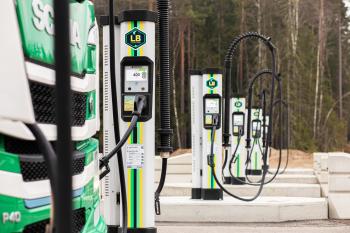Leading Swedish operator LBC Frakt is investing heavily in low- and zero-emission transport. What it needs now is not more targets, but rather pragmatic support to scale up progress.
IRU spoke with LBC Frakt, a transport company whose concrete investments in zero-emission vehicles, renewable fuels, and charging infrastructure show that the road transport sector is already driving the green transition forward.
Based in Karlstad, Sweden, and a member company of IRU member Sveriges Akeriföretag, LBC Frakt is a front-runner in this shift, taking decisive action to reduce emissions. From operating electric trucks and using renewable fuels to building public charging infrastructure, LBC Frakt is proving that the transition is not in the future, it is happening now.
With one of Europe’s most ambitious strategies for electrification and renewable fuels, the company is moving fast. But as LBC Frakt and other pioneers lead the way, they face significant challenges: high costs, slow issuance of permits, grid limitations, and inconsistent policies. What is needed now is practical support to sustain and speed up progress.
LBC Frakt General Director Anders Lööf said, “We are investing in the future. We ask policymakers to match that ambition through consistent rules, smart subsidies, and infrastructure investment to help the whole sector move faster.”
Sustainability embedded in operations
For LBC Frakt, the green transition is not just a goal, it is the framework for day-to-day operations.
“Sustainability considerations are present at all levels of our work, from strategic decisions to the smallest daily tasks,” explained Anders Lööf.
Electric trucks have transformed planning: drivers now schedule mandatory breaks around charging sessions, creating a more relaxed and safer driving rhythm. Even veteran drivers, initially sceptical, have embraced the change, praising the quiet, smooth ride especially in city traffic and low-speed zones.
Scaling investment and innovation
LBC Frakt is a first mover on electric trucks and continues to scale aggressively. In April 2025, it announced an order of 30 heavy-duty electric trucks (15 Volvo, 15 Scania) worth SEK 150 million. These will join the 25 e-trucks already in operation or in delivery, including a 94-tonne electric wood-chip truck, likely the heaviest and longest electric truck in the world. Used in forestry transport, it allows for a 36% increase in cargo per trip, cutting both costs and emissions.
Electric vehicles now run on both local and regional routes. For example, one Scania truck operates a 360km route from Karlstad to Falkenberg.
Infrastructure: critical and lagging
Fleet electrification depends on infrastructure. Through its subsidiary, Laddbolaget, LBC Frakt has built ten public high-capacity charging parks, with more underway. These stations are open to other operators too, helping the wider sector move forward. For its efforts, LBC Frakt received the 2024 Laddguldet award.
“We build infrastructure not just for today’s needs, but for what we’ll need in a few years,” said Anders Lööf.
Yet grid delays, slow permitting processes, and limited local capacity remain major barriers. The company often works directly with grid operators and municipalities to secure the upgrades – efforts that smaller hauliers may not be able to afford or manage.

Renewable fuels and hybrid solutions
Beyond electrification, LBC Frakt continues to decarbonise its combustion fleet using HVO100 (hydrogenated vegetable oil) and liquid biogas (LBG), wherever possible. It also deployed one of Sweden’s first hybrid trucks in 2020.
The company is active in innovation, including the TREE project (TRansition to Efficient Electrified forestry transport), which is electrifying timber supply chains and expected to eliminate over 1,000 tonnes of CO₂ emissions annually.
“Our approach is pragmatic,” said Anders Lööf. “Electrify what we can, fuel the rest with renewables, and keep innovating.”
Barriers: costs, delays and policy reversals
While committed to the transition, LBC Frakt faces high upfront vehicle and infrastructure costs. Electric trucks still cost around twice as much as diesel models, and chargers come with steep price tags. Smaller subcontractors face even greater hurdles.
The company also faces supply chain delays. “We aimed to reach 24 e-trucks by end-2024 – about 10% of our fleet – but we’re essentially in a queue with manufacturers,” said Anders Lööf.
Policy instability further complicates progress. The rollback of Sweden’s biofuel blending mandate (reduktionsplikt) in late 2022 set back momentum. “We were aligned with that policy, and its removal undercut the business case for biofuels.”
Message to policymakers: enable, don’t hinder
LBC Frakt’s message is clear: policymakers must match the transport sector’s ambition. The company calls for:
- Purchase subsidies and tax credits for zero-emission vehicles
- Long-term, stable climate policies beyond election cycles
- Public grants and reduced fees for charging infrastructure
- Fast-tracked grid upgrades and permit issuance
- Ongoing support for innovation and pilot projects
- No abrupt policy reversals that undermine planning and investment
Anders Lööf concluded, “We in the transport sector are retraining staff, retooling operations, and reinvesting profits because we believe this is the future.
“Don’t make it harder for those doing the right thing – support us with clear rules and the infrastructure to match. Together, we can decarbonise transport and stay competitive.”

